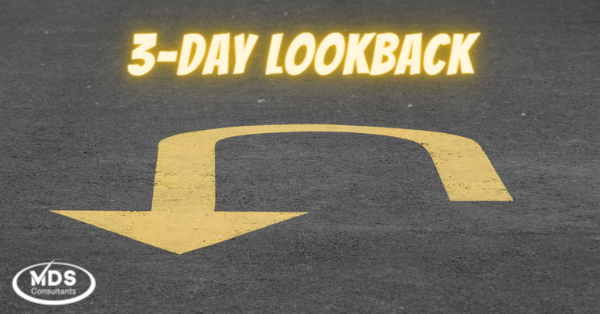This post is part of the MDS 2023 Countdown series. Disclaimer. Current as of March 24, 2023
What You Can Expect to See
New 3-day lookback/assessment periods are coming to the MDS world. There are different sections of the MDS that the Nurse Assessment Coordinators are going to have to code that require the 3 day lookback/assessment periods.
Communication and coordination between hospitals, nursing homes and discharge planning will be even more imperative. Facilities need to ensure ALL of the supporting documentation is complete within the first few days of the stay – and at the end of the stay.
What Is Changing
With section G leaving the MDS and GG taking over, will we be able to capture resident’s actual needs with ADLs in a 3-day lookback/assessment period? This is half the time and half the information compared to the 7-day lookback. What will this change impact?
Section G was used to determine the most assistance the resident requires. However Section GG determines the resident’s usual function. Potential impacts include:
- Reimbursement: If a facility does not capture the documentation correctly for section GG (due to lack of documentation or knowledge), there is a chance reimbursement will be negatively affected.
- Lookback period: All we have known is the 7-day lookback period for ADLs. This gave facilities time to capture declines, improvements, etc. in section G.
Now that time has been cut in half what will we be missing? With just 3 days, documentation will need to be accurate to capture the “usual” function of the resident.
Also, with this change are we really capturing the accuracy of the resident’s function for long term stays? Using only the first 3 days of the stay for an admission assessment will this reflect the resident’s actual need.
More options in Section K
Nutritional approaches have expanded into four options rather than two. The facility will report if the approaches were in place upon admission, which is considered days one through three of the stay, performed while not a resident (7 days), performed within the last seven days while a resident, and at discharge (last 3 days of the stay).
What will this mean? Communication and collaboration between hospital staff, nursing home staff and discharge planning is going to be crucial for these new lookback periods.
3 -day look back periods in Section O
The 3-day lookback/assessment period on admission and discharge for SNF stay residents in section O are also being added. These new lookbacks will greatly impact SPADES (Standardized Patient Assessment Data Elements). This lookback will help show improvements and declines during their stay and care coordination upon discharge.
- For example, was the resident on oxygen upon admission and will the resident need oxygen upon discharge? All these things are going to be a factor when looking at resident stays, assessments, CAA’s and care planning.
Recommendations from MDS Consultants
- Gathering all the information from hospitals will be crucial to ensure nursing homes obtain the correct information for these 3-day lookback/ assessment periods upon admission to the facilities.
- Ensure your staff is educated on the instructions for completing documentation in the 3-day lookback/assessment periods.
- Accurate documentation is the key to success with an effective RAI system process when meeting MDS coding guidelines.
- Set up an auditing and monitoring process as part of the facilities QAPI program to ensure that information is gathered and documented to support coding of the MDS.
These are all interesting factors that require ongoing attention through October 2023. Do not wait! The time to prepare is now.
